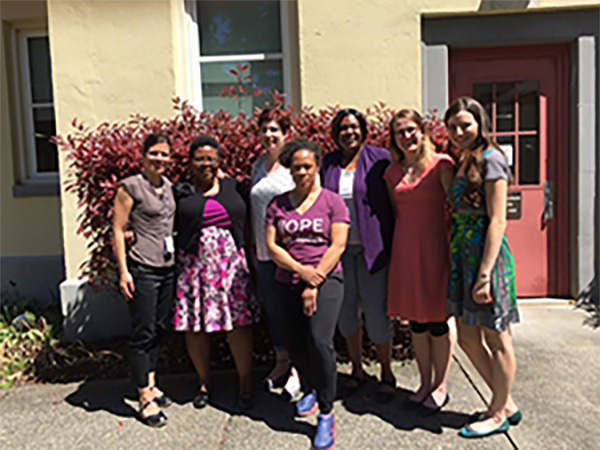 |
Improving Reproductive Planning Services for Women Veterans: The MyPath InterventionHSR&D’s monthly publication Veterans’ Perspectives highlights research conducted by HSR&D and/or QUERI investigators, showcasing the importance of research for Veterans – and the importance of Veterans for research. In the October 2019 Issue:
|
IntroductionLisa Callegari is a Career Development Awardee (CDA) and Core Investigator at the HSR&D Seattle-Denver Center of Innovation for Veteran-Centered and Value-Driven Care
Meeting the health needs of the rapidly growing population of reproductive-aged women Veterans is a national priority for VA. Reproductive planning services, including assessment of an individual’s reproductive goals followed by tailored contraceptive and/or preconception counseling, can reduce unintended pregnancy, improve pregnancy outcomes, and support reproductive autonomy and are recommended by national guidelines. Data indicate, however, that only 38% of women Veterans at risk of pregnancy report discussing contraception or preconception health with VA primary care providers in the past year, and these discussions are often perceived by Veterans as failing to incorporate their perspectives and needs. Gaps in high-quality, patient-centered reproductive planning services are further evidenced by women Veterans’ low knowledge of contraception and preconception health risks, suboptimal contraceptive use, and high rates of unintended pregnancy. To address these gaps, a team of HSR&D researchers based in Seattle and Pittsburgh, and led by Dr. Lisa Callegari, developed “MyPath” – a novel, patient-facing, web-based decision support tool designed to be used prior to primary care visits. MyPath’s objectives are to help women Veterans consider their reproductive goals in a health and psychosocial context; augment their knowledge; align pregnancy timing and contraceptive decisions with their goals, priorities, and preferences; and communicate effectively with primary care providers about their needs at their visit. “[Providers] don’t initiate the conversation…how about [outreach] that says, ‘Planning on becoming pregnant? Please discuss with your provider.’ Something to spark the conversation.” Development and Pilot Testing of the MyPath InterventionThe study team developed MyPath using a rigorous process incorporating input from both Veterans and scientific experts. During the development process, investigators assessed women Veterans’ needs related to reproductive planning counseling and care. The study team conducted in-depth interviews with women Veterans ages 18-44 receiving VA primary care to explore past experiences and current preferences related to reproductive planning counseling in the military and/or VA. Findings from this study were published in Women’s Health Issues (Callegari, et al., 2019). Using these results, the study team designed, tested, and refined a web-based prototype. During pilot testing of the prototype, Veterans found MyPath highly acceptable, and reproductive planning discussions increased by more than 30% without increasing providers’ perceived workload. MyPath users had significant gains in provider-patient communication self-efficacy, contraceptive decision quality, and use of effective contraceptive methods. “If someone asked, I was probably thinking about it already, but didn’t know how to ask. If they went ahead and made that part of their routine or part of the appointment, I think I’d be more apt to talk about it and probably accept suggestions.” The MyPath Tool“Make it personalized to each person, not to be just reading a script from the computer that tells you ‘this is what you do for this.’ Get to know the person and see what they’re like.” The MyPath tool provides interactive education and decision support to empower women to make high-quality decisions and to help them communicate effectively with providers about their individual preferences and needs. MyPath includes sections on:
MyPath also includes Topic Buttons in informational sections that enable users to flag topics that are relevant to them and a free text Question Box where users can enter questions that they would like to discuss with providers. After completing the tool, users can email themselves a Summary Page which includes their goals, topics of interest, questions, and contraceptive recommendations that can be shared with providers. 
The MyPath tool provides reproductive decision support via web and mobile access. “Letting [women] know that they’re there for them if they wanted to talk about anything, that there’s no judgment, that there’s nothing but help and care for you.” Veteran EngagementVeterans were included throughout the MyPath development process. In-depth qualitative interviews provided perspective on women Veterans’ preferences and needs related to reproductive planning services. A group of participants in those interviews who expressed a desire to contribute further to improving this care for Veterans was asked to join a Veteran Engagement Group. This diverse group of women provided ongoing feedback and input throughout all stages of development and testing of the tool. After development of the initial web-based prototype, women Veterans who had not been involved in the development process participated in cognitive interviews that enabled further refinement of the tool. 
Dr. Callegari (left) with members of the MyPath Veteran Engagement Group and MyPath VA team members Sara Magnusson and Erica Tartaglione (right). Women's Perceptions of the MyPath ToolIn survey responses, 100% of Veterans who used the tool felt that MyPath was useful for thinking about one or more topic areas (menstrual cycle/fertility, preconception health, contraception). Nearly all (97%) confirmed that they gained new information from using MyPath, and 93% would recommend MyPath to other women Veterans. Open-ended survey questions prompted positive responses including: “It was helpful in helping me get ready mentally for my appointment.”
“It’s nice because it has things you may not normally think to ask your provider.”
“This is so helpful for me right now! …This is answering so many of my questions I had for my provider.” Moving Forward“I really wish this was something that existed for all appointment types within the VA, so you can go in prepared.” Next steps for the MyPath intervention include testing in a randomized controlled trial to assess effectiveness in increasing the frequency of patient-centered reproductive planning counseling discussions in VA primary care – and improving both patient-centered outcomes (i.e., Veterans’ communication self-efficacy and decision quality) and clinical outcomes (i.e., contraceptive use, unintended pregnancy and preconception health behaviors). To address VA’s priority of designing and testing interventions that can be broadly implemented and scaled, the research team will investigate novel strategies for delivery of the link to the MyPath tool using text messages. The research team is working closely with operational leaders in Women’s Health Services to ensure that research findings can be rapidly translated into practice if MyPath is found to be effective, with the ultimate objective of improving reproductive health outcomes and well-being among women Veterans nationally. * All quotes are from research interviews with women Veteran participants. Funding for the MyPath project has been provided by Dr. Callegari’s HSR&D Career Development Award, a pilot grant from the VA Center for Health Equity Research and Promotion (CHERP) to Dr. Callegari and Dr. Sonya Borrero, a VA Puget Sound R&D Seed Grant to Dr. Callegari, and VA Women’s Health Services. |